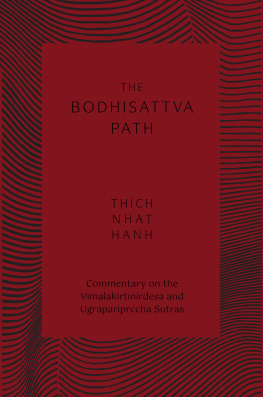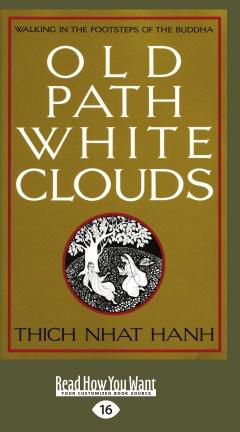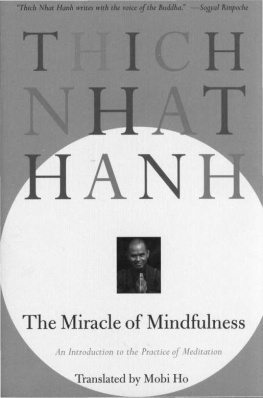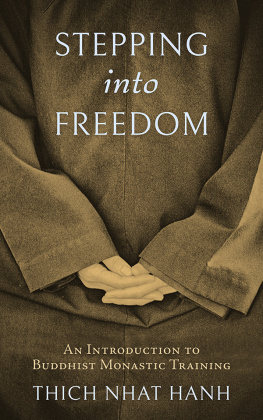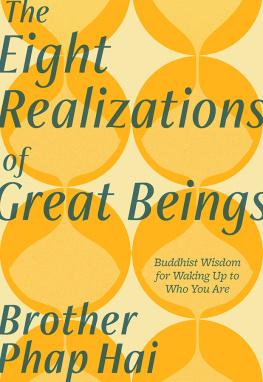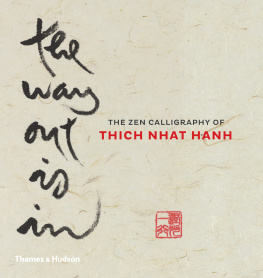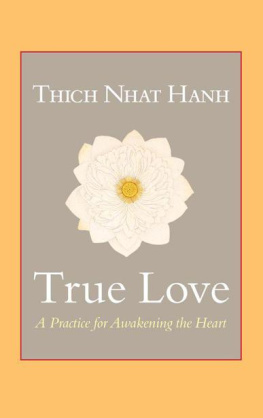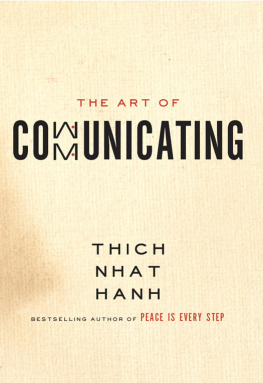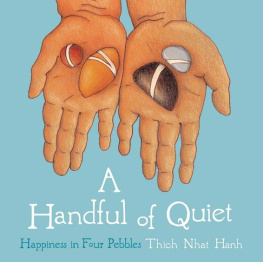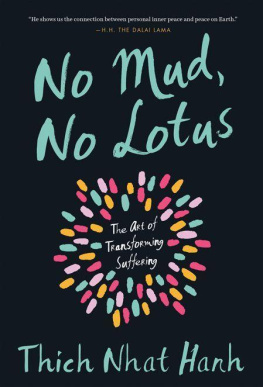two treasures

Other Parallax Press Books by Thich Nhat Hanh
Being Peace
Call Me by My True Names:
The Collected Poems of Thich Nhat Hanh
Calming the Fearful Mind:
A Zen Response to Terrorism
The Energy of Prayer:
How to Deepen Your Spiritual Practice
Keeping the Peace:
Mindfulness and Public Service
Old Path White Clouds
Present Moment Wonderful Moment
Teachings on Love
Touching Peace
Understanding Our Mind

Parallax Press
P.O. Box 7355
Berkeley, California 94707
www.parallax.org
Parallax Press is the publishing division of Unified Buddhist Church, Inc.
Copyright 2007 by Unified Buddhist Church.
Portions of this book were first published as The Sutra on the Eight Realizations of the Great Beings, ISBN 0-938077-07-4, Copyright 1987 by Unified Buddhist Church.
All Rights Reserved.
No part of this book may be reproduced in any form or by any means, electronic or mechanical, including photocopying, recording, or by any other information storage and retrieval system or technologies now known or later developed, without permission in writing from the publisher.
Edited by Rachel Neumann.
Cover and text design by Debbie Berne, Herter Studio LLC
Library of Congress Cataloging-in-Publication Data
Nhat Hanh, Thich.
Two treasures : Buddhist teachings on awakening and true happiness / Thich Nhat Hanh.
p. cm.
Includes bibliographical references.
ISBN 978-1-935209-32-4
1. Ba da ren jue jing--Commentaries. 2. Tipitaka. Suttapitaka. Khuddakanikaya. Khuddakapatha Mangalasutta--Commentaries. I. Ba da ren jue jing. English. II. Tipitaka. Suttapitaka. Khuddakanikaya. Khuddakapatha. Mangalasutta. English. III. Title.
BQ1529.5.P347N53 2007
294.38232--dc22
2006028066
table of contents
WHEN I WAS SEVENTEEN and in my first year of novice studies at a Buddhist monastery in Vietnam, I had to memorize the Sutra on the Eight Realizations of the Great Beings and the Discourse on Happiness. Over sixty years have passed, and I still find these two texts to be torches that help light my path.
In 1978, I became involved in a project to rescue Vietnamese boat people in the South China Sea. We printed the Sutra on the Eight Realizations of the Great Beings in a small booklet in Vietnamese to help the survivors as they found a new home somewhere in the world. Soon, we found this sutra, as well as the Discourse on Happiness, to be very helpful for those in the West as well. All of us, whatever our past experiences, are struggling to find happiness and realize full consciousness in our daily lives.
I invite you to read this book at a time when your body and mind are completely relaxed, for example after taking a comfortable bath. You can light a candle or a stick of incense to give the room a pleasant glow or fragrance. Then, read one of these sutras slowly to discover its deepest meaning. These sutras are thousands of years old, but it is only by relating them to your own lifes experience that they come alive and you can understand them.
The more you meditate on these sutras, the more deeply you will discover the profound wisdom they contain. The two sutras in this book complement each other. They can be read separately, but together they explain in practical detail how to progress step-by-step toward awakening and happiness.
Thich Nhat Hanh
July, 2006
WHOLEHEARTEDLY, day and night, a disciple of the Buddha should recite and meditate on the eight realizations discovered by the great beings.
The First Realization is the awareness that the world is impermanent. All political regimes are subject to fall; all things composed of the four elements are empty and contain the seeds of suffering.being born and constantly dying. They are empty of self, without sovereignty. The mind is the source of all confusion, and the body is the forest of all impure actions. If we meditate on these facts, we can gradually be released from samsara, the round of birth and death.
The Second Realization is the awareness that more desire brings more suffering. All hardships in daily life arise from greed and desire. Those with little desire and ambition are able to relax, their bodies and minds free from entanglement.
The Third Realization is that the human mind is always searching for possessions and never feels fulfilled. This causes impure actions to ever increase. Bodhisattvas however, always remember the principle of having few desires.the realization of perfect understanding as their only career.
The Fourth Realization is the awareness of the extent to which laziness is an obstacle to practice. For this reason, we must practice diligently to destroy the unwholesome mental factors that bind us, and to conquer the four kinds of Mara,
The Fifth Realization is the awareness that ignorance is the cause of the endless round of birth and death. Therefore, bodhisattvas always remember to listen and learn in order to develop their understanding and eloquence. This enables them to educate living beings and bring them to the realm of great joy.
The Sixth Realization is the awareness that poverty creates hatred and anger, which creates a vicious cycle of negative thoughts and activity. When practicing generosity, bodhisattvas consider everyone, friends and enemies alike, as equal. They do not condemn anyones past wrongdoings, nor do they hate those who are presently causing harm.
The Seventh Realization is that the five categories of desire lead to difficulties. Although we are in the world, we should try not to be caught up in worldly matters. A monk, for example, has in his possession only three robes and one bowl. He lives simply in order to practice the Way. His precepts keep him free of attachment to worldly things, and he treats everyone equally and with compassion.
The Eighth Realization is the awareness that the fire of birth and death is raging, causing endless suffering everywhere. We should take the Great Vow to help everyone, to suffer with everyone, and to guide all beings to the realm of great joy.
These eight realizations are the discoveries of great beings, buddhas, and bodhisattvas who have diligently practiced the way of compassion and understanding. They have sailed the Dharmakaya If the disciples of the Buddha recite these eight realizations and meditate on them, they will put an end to countless misunderstandings and difficulties and progress toward enlightenment, leaving behind the world of birth and death, dwelling forever in peace.
THE MOST ACCESSIBLE WAY to approach the Sutra on the Eight Realizations of the Great Beings is to see each of the eight items discussed as a subject of meditation. In addition, there are eleven guidelines for daily living that can be found in the sutra. Although the form of the sutra is simple, its content is extremely profound and marvelous. This sutra is not an analytical treatise or a historical artifact; its a realistic and effective approach to meditation and a guide for our interactions with others.
THE FIRST REALIZATION
The first realization explains and clarifies the four basic subjects of Buddhist meditation: impermanence, suffering, no-self, and impurity. We must always remember and meditate on these four principles of reality. As mentioned in the sutra, if someone meditates on these facts, she will gradually be released from samsara, the round of birth and death.
Impermanence
Next page

